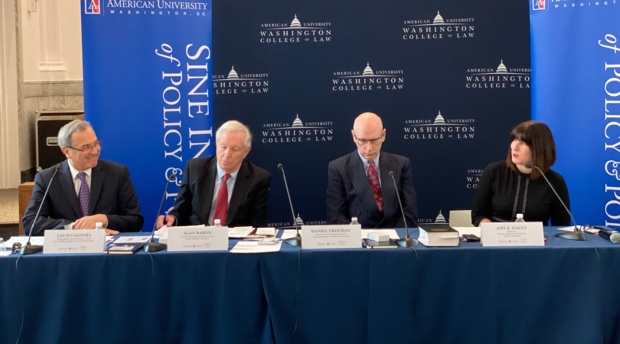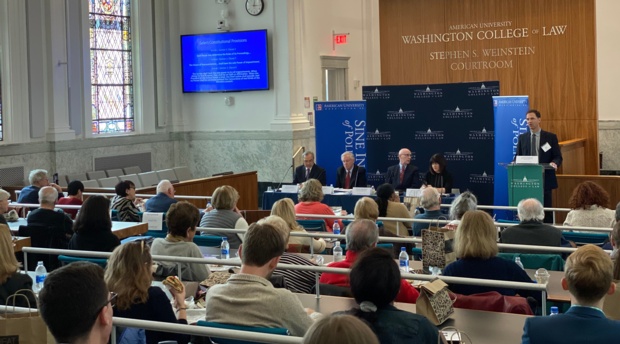AUWCL, Sine Institute, and Center for Congressional and Presidential Studies Take on Impeachment
Nov. 6. 2019

On Wednesday, Nov. 6, American University Washington College of Law’s Program on Law and Government, in partnership with American University Sine Institute of Policy and Politics and the Center for Congressional and Presidential Studies (CCSP), presented “Impeachment: The Constitutional Remedy of Last Resort.”
Professor David Barker, CCSP director, welcomed attendees to the panel event, which discussed the history and procedure of the impeachment process. The conversation was moderated by Sine Institute Executive Director Amy Dacey, and featured Distinguished Adjunct Professor of Law and a Senior Affiliate in the Program on Law and Government Louis Caldera; Research Fellow in Residence at CCPS Daniel Freeman; and former Special Impeachment Counsel for the House Judiciary Committee Alan Baron.
The framers of the Constitution felt the opportunity for impeachment was an important provision as it was integral to the concept of separation of powers, Caldera said.
“Alexander Hamilton was the strongest proponent of a strong presidency, but also someone who feared a presidency without accountability. That any president who could erogate to themselves the judicial power, or legislative power, might become like King Richard—become a monarch, and destroy liberty itself,” Caldera said. “The remedy for these fears was what we know as checks and balances…and the check on the president was the impeachment power.”
There have been 19 formal impeachments in American history, Baron said—mostly federal judges, along with the impeachment of two presidents, Andrew Johnson and Bill Clinton. Under U.S. law, impeachment requires the person be removed from office, Baron explained, and possibly barred from holding “a future position of honor, trust, or profit.”

“Whereas in England impeachment was a criminal proceeding, in the United States it was remedial in nature—it’s neither a criminal prosecution nor a form of civil litigation. It’s a unique, remedial process designed to remove from office federal public officials who (through) conduct have shown themselves to unworthy of holding federal public office. The intent is not to punish the individual, but to protect the public,” Baron said. Baron is a D.C. attorney whose practice has focused on high profile white collar criminal matters and complex civil litigation. He also frequently serves as special counsel to government entities, and has served as special impeachment counsel in the impeachment proceedings of federal judges Alcee Hastings, Walter Nixon, G. Thomas Porteous, and Samuel B. Kent.
Not every criminal offense calls for impeachment, he added, and the basis for impeachment does not have to be a criminal offense.
“There is actually no standard of proof for impeachment in either the House of the Senate,” said Freeman, who was counsel and parliamentarian to the House Judiciary Committee under three separate chairmen of both parties, and served as the staff counsel on three judicial and one presidential impeachment.
“The judges in the three cases I worked on wanted there to be a standard of beyond a reasonable doubt,” Freeman said. “That was not agreed to by the House of the Senate…the phrase that was used is, ‘It’s left to the conscious of each elected member.’”